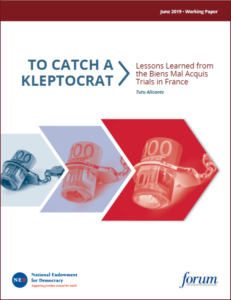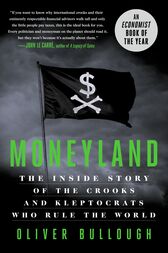 The spread of kleptocracy, or “rule by thieves,” has harmed the poorest and most vulnerable populations worldwide most of all. But it also destabilizes entire regions, creating new fertile recruiting ground for terrorist groups and other security challenges for the United States, according to the Hudson Institute’s Kenneth Weinstein and Nate Sibley, a policy fellow in the Kleptocracy Initiative.
The spread of kleptocracy, or “rule by thieves,” has harmed the poorest and most vulnerable populations worldwide most of all. But it also destabilizes entire regions, creating new fertile recruiting ground for terrorist groups and other security challenges for the United States, according to the Hudson Institute’s Kenneth Weinstein and Nate Sibley, a policy fellow in the Kleptocracy Initiative.
Strategic rivals and rogue regimes, such as China, Russia, North Korea, Venezuela, and Iran all rely on crime and corruption to consolidate their grip on power and promote their foreign policy. That shows why nothing enrages the Kremlin more than attempts to highlight the stolen wealth of Vladimir Putin and his cronies, as the Hudson Institute found out last year, they write for The Hill.
Traditionally, Western policymakers and stakeholders fighting this type of corruption have failed to tackle the “transnational networks and global services that enable kleptocracy,” focusing instead on the countries where the money is stolen and on kleptocrats themselves, notes Elsa Peraldi, Global Integrity’s Manager for Integrity & Anti-corruption. For example:
- Strategic litigation has been used to bring cases in the United States, France, Switzerland, and the United Kingdom against corrupt officials in Equatorial Guinea, Venezuela, Malaysia, Russia, and Kazakhstan, to name a few . However, obtaining convictions can take as long as 10 years, as in the case against Equatorial Guinea’s Vice President Teodoro Nguema Obiang. Once a conviction is obtained, the process of returning the assets might even fall into limbo due to the lack of established regulations and procedures to return stolen assets.
- Sanction lists in the United States have been created to prevent certain corrupt officials from continuing to operate freely. Unfortunately, the sanctions focus on individuals and do not affect the networks that enable kleptocratic behaviour.
- Beneficial ownership registers in the United Kingdom have increased transparency to identify the true owners of shell companies. Yet, in the U.S., efforts to pass beneficial ownership legislation have been thwarted by the American Bar Association, mostly over concerns around attorney-client privilege and anti-money laundering reporting. …
- Investigative reports have exposed kleptocrats’ networks in some cases, but the threat of libel lawsuits continues to obstruct efforts to investigate….
 Only by following a problem-driven, learning-centred, and adaptive approach can anti-corruption organizations learn how to more effectively counter the negative effects kleptocracy has in both Western democracies and in the countries where resources are looted, Peraldi adds. RTWT.
Only by following a problem-driven, learning-centred, and adaptive approach can anti-corruption organizations learn how to more effectively counter the negative effects kleptocracy has in both Western democracies and in the countries where resources are looted, Peraldi adds. RTWT.
Russia’s kleptocratic regime subverts the West’s legal institutions for its own ends, according to a new report and Oliver Bullough’s Moneyland. But how can the U.S. exploit the soft, kleptocratic underbelly of dictatorships? Stanford University’s Larry Diamond asks in his latest book.
Because victims of transnational kleptocracy often have little recourse for achieving justice domestically, strategic litigation in overseas courts offers another avenue to pursue justice abroad, the National Endowment for Democracy’s International Forum for Democratic Studies observes. Its latest report (above) highlights a groundbreaking case of strategic litigation, known as the Bien Mal Acquis (‘ill-gotten gains”) case, which made its way through the French courts over the past decade.







